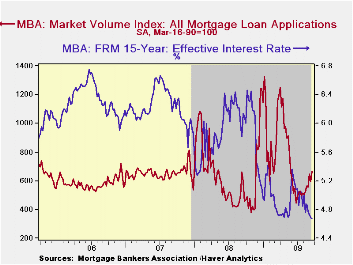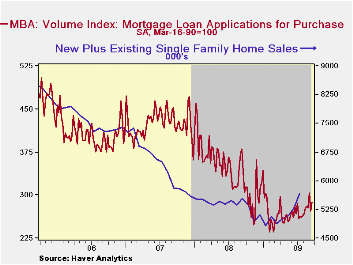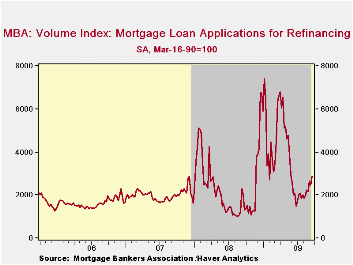 Global| Sep 23 2009
Global| Sep 23 2009U.S. Weekly Mortgage Applications Strengthen As Interest Rates Near The Lowest Since 2003
by:Tom Moeller
|in:Economy in Brief
Summary
The Mortgage Bankers Association indicated that mortgage applications overall increased 12.8% last week as lower interest rates spurred strength in refinancings. Applications to refinance jumped 17.4% last week and in September they [...]
 The Mortgage
Bankers Association indicated that mortgage applications overall
increased 12.8% last week as lower interest rates spurred strength in
refinancings. Applications to refinance jumped 17.4% last week and in
September they have risen 29.3% from August. Nevertheless, since their
peak this past January refinance applications have fallen by nearly
two-thirds.
The Mortgage
Bankers Association indicated that mortgage applications overall
increased 12.8% last week as lower interest rates spurred strength in
refinancings. Applications to refinance jumped 17.4% last week and in
September they have risen 29.3% from August. Nevertheless, since their
peak this past January refinance applications have fallen by nearly
two-thirds.
I tandem, there has been lesser strength in purchase applications. Applications rose 5.6% last week and that made up roughly half of the prior week's decline. So far this month purchase applications have risen 4.6% from August after that month's 3.4% increase. Since the early-February low purchase applications have risen 22% as new and existing home sales have recovered. During the last ten years there has been a (negative) 79% correlation between the level of applications for purchase and the effective interest rate on a 30-year mortgage. Moreover, during the last ten years there has been a 61% correlation between the y/y change in purchase applications and the change in new plus existing single family home sales.
 The effective
interest rate on a conventional 15-year mortgage fell last week to
4.67%, down from the high of 5.21% averaged during June. These figures
are near the lowest since 2003. For a 30-year mortgage the rate also
fell last week to 5.19% after reaching a high of 5.79% in early-June.
Interest rates on 15-year and 30-year mortgages are closely correlated
(>90%) with the rate on 10-year Treasury securities. Rates on
adjustable 1-Year mortgages averaged 6.66% this month versus the low
near 6.0% during January. Nevertheless, the rate remained down from the
7.07% peak reached last fall.
The effective
interest rate on a conventional 15-year mortgage fell last week to
4.67%, down from the high of 5.21% averaged during June. These figures
are near the lowest since 2003. For a 30-year mortgage the rate also
fell last week to 5.19% after reaching a high of 5.79% in early-June.
Interest rates on 15-year and 30-year mortgages are closely correlated
(>90%) with the rate on 10-year Treasury securities. Rates on
adjustable 1-Year mortgages averaged 6.66% this month versus the low
near 6.0% during January. Nevertheless, the rate remained down from the
7.07% peak reached last fall.
Though they have recovered of late, since the beginning of this year fixed-rate mortgage applications have fallen by slightly more than one-half while adjustable-rate mortgages have more than doubled. The number of conventional loans has fallen nearly two-thirds but gov't backed loans.
 The Mortgage
Bankers Association surveys between 20 to 35 of the top lenders in the
U.S. housing industry to derive its refinance, purchase and market
indexes. The weekly survey covers roughly 50% of all U.S. residential
mortgage applications processed each week by mortgage banks, commercial
banks and thrifts. Visit the Mortgage Bankers Association site here. The figures for weekly
mortgage applications are available in Haver's SURVEYW
database.
The Mortgage
Bankers Association surveys between 20 to 35 of the top lenders in the
U.S. housing industry to derive its refinance, purchase and market
indexes. The weekly survey covers roughly 50% of all U.S. residential
mortgage applications processed each week by mortgage banks, commercial
banks and thrifts. Visit the Mortgage Bankers Association site here. The figures for weekly
mortgage applications are available in Haver's SURVEYW
database.
TALF: Jump-Starting the Securitization Markets from the Federal Reserve Bank of Dallas is available here.
| MBA Mortgage Applications (3/16/90=100) | 09/18/09 | 09/11/09 | Y/Y | 2008 | 2007 | 2006 |
|---|---|---|---|---|---|---|
| Total Market Index | 668.5 | 592.8 | 13.0% | 642.9 | 652.6 | 584.2 |
| Purchase | 288.3 | 272.9 | -15.8 | 345.4 | 424.9 | 406.9 |
| Refinancing | 2,881.5 | 2,454.5 | 41.0 | 2,394.1 | 1,997.9 | 1,634.0 |
| 15-Year Effective Interest Rate (%) | 4.7% | 4.7% | 6.1% (9/08) | 5.9% | 6.2% | 6.3% |
Tom Moeller
AuthorMore in Author Profile »Prior to joining Haver Analytics in 2000, Mr. Moeller worked as the Economist at Chancellor Capital Management from 1985 to 1999. There, he developed comprehensive economic forecasts and interpreted economic data for equity and fixed income portfolio managers. Also at Chancellor, Mr. Moeller worked as an equity analyst and was responsible for researching and rating companies in the economically sensitive automobile and housing industries for investment in Chancellor’s equity portfolio. Prior to joining Chancellor, Mr. Moeller was an Economist at Citibank from 1979 to 1984. He also analyzed pricing behavior in the metals industry for the Council on Wage and Price Stability in Washington, D.C. In 1999, Mr. Moeller received the award for most accurate forecast from the Forecasters' Club of New York. From 1990 to 1992 he was President of the New York Association for Business Economists. Mr. Moeller earned an M.B.A. in Finance from Fordham University, where he graduated in 1987. He holds a Bachelor of Arts in Economics from George Washington University.
More Economy in Brief
 Global| Feb 05 2026
Global| Feb 05 2026Charts of the Week: Balanced Policy, Resilient Data and AI Narratives
by:Andrew Cates






